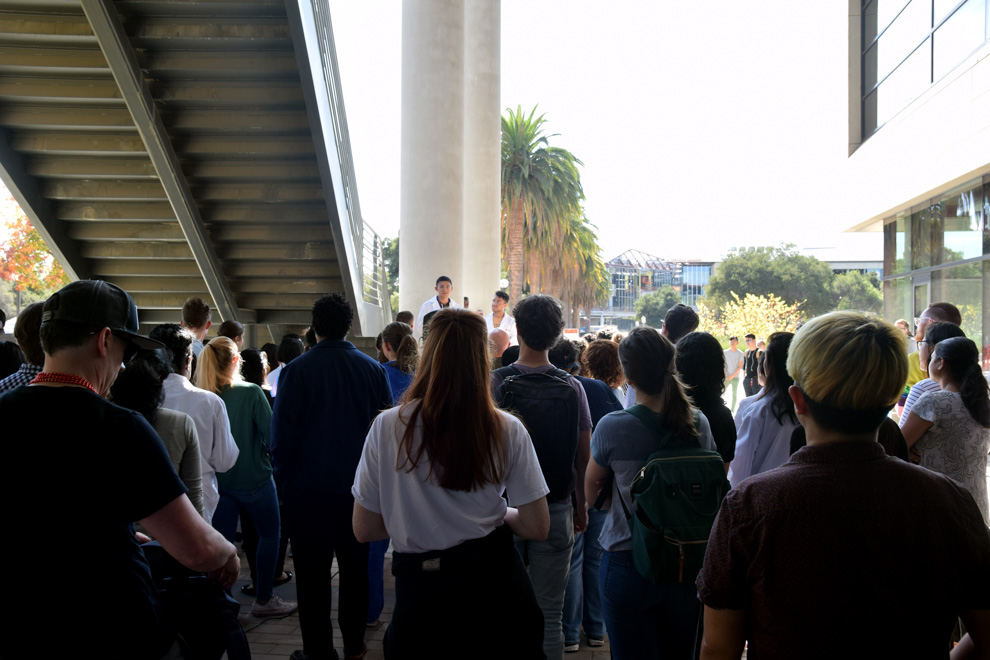On Thursday, members of the Stanford community gathered in a rally to support the rights of intersex, transgender and gender-expansive people in opposition to a recently leaked Department of Health and Human Services (HHS) memo.
According to The New York Times, which obtained the leaked document, the memo outlined proposed efforts to establish a legal definition of sex under Title IX. Specifically, the memo at one point proposed defining sex as “a person’s status as male or female based on immutable biological traits identifiable by or before birth.”
The rally, which took place at the Stanford Medical School, was organized by LGBTQ-Meds, an activist and social organization.
“We stand against the memo and in solidarity with the transgender, intersex and gender nonconforming community,” wrote rally co-organizer Marija Kamceva M.D. ’21 in an email to The Daily. “[The rally aims] to show that [we are] … future health professionals committed to our patients, and … people who understand the absurdity of trying to erase an identity.”
Thursday’s rally, spearheaded by the Medical Student Pride Alliance (MSPA) – the first national LGBTQ organization for medical students – was held as part of a national effort to oppose the HHS memo. On Sunday, following publication of the memo, LGBTQ-Meds members and MSPA co-founders Kamceva, Justin Jia M.D. ‘21 and Tim Keyes MSTP ‘19 wrote an open letter on behalf of MSPA. The letter garnered 1500 signatures within the first day of publication.
“We felt the need to do more and have actionable next steps for us and the whole community,” Kamceva wrote.
According to her, the decision to hold a rally stemmed from a desire to show that there is power in numbers. Kamceva emphasized LGBTQ-Meds’ perspective as a medical student organization.
“The urgency also comes from our perspective as future medical providers – the memo is not based on science or reality,” she wrote.
Kamceva also mentioned health disparities between the general population and the intersex, transgender and gender-expansive communities.
“In light of these health disparities and our duty to do no harm, we felt it is now more important than ever to support the transgender, intersex and genderqueer/gender non-conforming communities,” she wrote.
Three speakers spoke at the rally, and there were tables encouraging people to donate to transgender, intersex and gender-expansive organizations such as TGI Justice Project and interACT Advocates for Intersex Youth. There was also information available on actionable next steps and the upcoming election on Nov. 6.
Bioengineering Ph.D. candidate Ethan Li spoke about their experience as a gender non-binary student at Stanford.
“[The HHS memo] is physically painful for me,” Li said. “It reminds me yet again how much power is held by people trying to erase the existence of transgender and gender non-conforming people.”
Li encouraged the audience to continue advocacy for intersex, transgender and gender-expansive people in memory of Skylar Lee, a 16-year-old transgender Korean American activist who committed suicide in 2015.
The second speaker, an anonymous transgender medical student who asked to be referred to as X, spoke through a letter read in their place by Torsten Rotto M.D. ’21.
“The current administration does not want trans people to survive,” X wrote. They went on to list possible repercussions of the changes proposed in the HHS memo.
“[The changes pose] physical, immediate danger for millions of people in our society,” X wrote.
They also explained their decision to remain anonymous, writing that they are “exhausted” and no longer wished to engage in public activism. Instead, they encouraged allies to engage in activism on behalf of transgender people.
“All I can do right now is medical school,” X wrote.
The rally’s final speaker, McKenzie Eakin M.D. ’21, started her speech by noting her cisgender identity. She said she was aware that it might seem like it should not be a cisgender woman who spoke at a rally in support of transgender, intersex and gender-expansive people, but she framed her speech as a response to the previous writer’s call for allies to take a stand.
In her speech, Eakin stressed the small ways people can be more inclusive, such as always giving one’s own pronouns.
The rally’s audience was not limited to members of the Medical School. According to Li, who is not a medical student, rally information was forwarded to various mailing lists across Stanford’s campus.
“It gives me hope,” Li said, referring to the diverse turnout. “That was good to see, that … everyone was kind of coming together.”
“In terms of success, we’ll have to see if there is a [measurably] different feeling for trans and gender-non-conforming folks on campus, but I think [the rally] was a good step towards that,” they added.
Hannah Matsunaga J.D. ’19 said she attended the rally because “any person of conscience who claims to support trans folks right now has a moral obligation to show up and to take concrete actions.” She also noted her perspective as a cisgender woman, saying, “If you are cis, and you have trans people in your life or you care about trans people, you need to show up.”
Matsunaga mirrored medical students’ efforts at supporting the transgender, intersex and gender-expansive communities from a medical point of view, noting how both the law and the HHS memo’s proposed changes in interpretation of Title IX would affect those communities. She said the HHS memo’s proposal “goes against the way every court of appeals in the nation has interpreted sex in various laws.” She also stressed that the proposed change could remove protections for those communities in different aspects of life.
“I was really happy to see such a strong showing from the med school,” said rally attendee Rachel Sohl J.D. ’21. “I’m really impressed. Now I’m going to take that back to the law school.”
Contact Evan Peng at pengevan ‘at’ stanford.edu.
